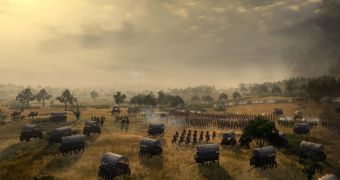SEGA, as the publisher, and The Creative Assembly, as the developer, have announced that they plan to release an expansion for Empire: Total War, called Warpath, which is set to allow gamers to play as the Native American Indians in a new campaign that is set in North America and allows the tribes to stand up to and defeat the nascent American Republic, which is encroaching into their territory. The interesting thing about the Warpath expansion is that it will be delivered only via the Steam digital distribution service from Valve and will cost just 9.99 dollars. The new factions can be used in the single-player game and in multiplayer battles.
The Native American tribes that can be played are the Iroquois, Huron, Plains, Pueblo and Cherokee nations. Each of them will have a unique technology tree that can be explored and special units, most of them focusing on mobility and surprise, which can be built. The map of the new single-player campaign is also more detailed than the North American one, which is currently depicted in Empire: Total War and allows for more complex tactics. There are also new Elite units included, like the Mohawk Elite Warriors, Cheyenne Dog Soldiers and Navajo Scout Warriors, and new agents, specific to the Indians, like the Scout and the Shaman.
At the moment, The Creative Assembly has also released the 1.4 patch for Empire: Total War, which is set to further improve the strategy title by eliminating some bugs and increasing performance. The developers are saying that the Artificial Intelligence is especially more capable of putting up a fight.
At this point in time, The Creative Assembly is also working on Napoleon: Total War, which is set to arrive early in 2010 and allow gamers to play as Napoleon and conquer Europe, while leading France to greatness, but also as his adversaries, in order to stop the Republican juggernaut. The Creative Assembly aims to push the engine used in Empire to its limits, adding even more units on screen at the same time and fleshing out the Napoleonic historical period.

 14 DAY TRIAL //
14 DAY TRIAL //